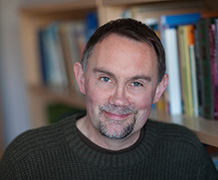
Professor Charles Abraham
Exeter scientist named in top 100
A psychologist who specialises in behaviour change has been named among the top 100 leading practising UK scientists, as drawn up by the Science Council.
Professor Charles Abraham, of the University of Exeter Medical School, features on the list, which seeks to draw attention to a wider network of scientists from those who are traditionally publicly recognised.
Professor Abraham said: “It’s an honour to be included in this list and I am especially pleased to be recognised for my contribution to training and supervision in health psychology. I didn’t know I had been nominated, so this is a fantastic surprise. I have always sought to ‘share knowledge and train the next generation’, which was one of the selection criteria.”
Professor Abraham’s work focuses on designing, evaluating and putting into place evidence-based approaches to changing health-related behaviour patterns. He works on reducing unsafe sexual encounters among young people, promoting exercise and healthy diets as well as reducing risky alcohol use among young people. He also conducts research on blood donation, encouraging patients to report symptoms of illness and helping patients manage illnesses such as diabetes..
Professor Angela Shore, Vice Dean (Research) at the University of Exeter Medical School, said: “I am delighted at this endorsement of the extremely high calibre of Professor Abraham’s work, which is a reflection of the world-class research that takes place here in Exeter.”
To identify its list of 100, the Science Council organised a competition around ten different types of scientist role. The list has ten different examples of each of the ten types and gives a broad picture of the many different ways people work with science, making valuable contributions across British society and the economy. The final selection was made by a panel of distinguished scientists appointed by the council.
It was designed to recognise individual scientists who illustrate a commitment to the practice of science with integrity, who exercise professional skill and judgement in their work and who contribute to their profession and the future of their subject through their leadership.
Chief executive of the Science Council, Diana Garnham, said: “Science is like an orchestra. It takes many instruments working together to produce a fine performance. At the moment, almost exclusively, it is the virtuosity of the soloists being addressed and praised. Of course, they are essential to science and should be valued accordingly. However, we must, at the same time, recognise and encourage the many other types of contributory scientific talent and experience.”
After seeing the list David Willetts, Minister for Universities and Science said: "This list helpfully challenges the perception that there is only one kind of scientist and highlights the different types of skills and challenges a career in science involves. If we want more people to enter a career in science we need to show that the scientific community is not some exclusive club but people with a wide variety of vocations and interests who have rewarding careers and are making a significant contribution to the wealth and well-being of the UK."
Date: 17 January 2014
